| SHADOWS ON THE WALL | REVIEWS | NEWS | FESTIVAL | AWARDS | Q&A | ABOUT | TALKBACK | |||||
 Shadows off the beaten path Shadows off the beaten pathIndies, foreign, docs and shorts...
On this page:
ALL QUIET ON THE WESTERN FRONT |
CLOSE |
EO
| |||||
| See also: SHADOWS FILM FESTIVAL | Last update 24.Dec.22 | |||||
|
All Quiet on the Western Front Im Westen Nichts Neues Review by Rich Cline | 
| |||||
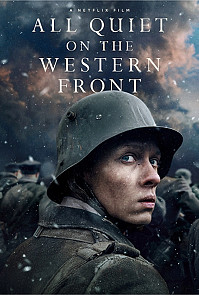 dir Edward Berger scr Edward Berger, Lesley Paterson, Ian Stokell prd Edward Berger, Daniel Marc Dreifuss, Malte Grunert with Felix Kammerer, Albrecht Schuch, Aaron Hilmer, Moritz Klaus, Edin Hasanovic, Daniel Bruhl, Thibault de Montalembert, Devid Striesow, Adrian Grunewald, Andreas Dohler, Sascha Nathan, Sebastian Hulk release US 7.Oct.22, UK 28.Oct.22 22/Germany 2h28 TORONTO FILM FEST Is it streaming? |
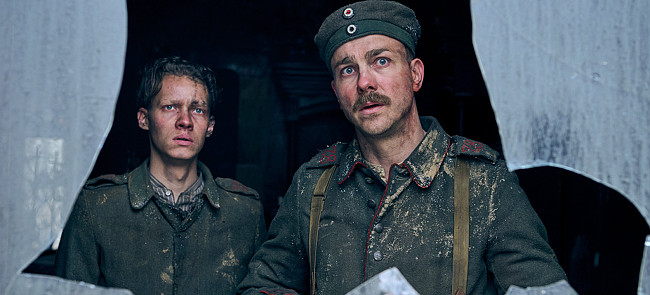 Strikingly well shot with attention to both enormous scale and intimate detail, this German WWI odyssey may not have much new to say, but it's assembled with such skill and insight that it grips the attention from start to finish. Filmmaker Edward Berger adds artistic touches all the way through, and finds remarkable nuance in a variety of situations. And the German perspective adds a notably original touch. In spring 1917, 17-year-old Paul (Kammerer) forges his father's signature to join the German army with his school friends. Optimistic and proud to be serving his country, he enthusiastically heads into battle. The true horrors of warfare reveals themselves almost immediately, and Paul finds lasting camaraderie with older soldier Katczinsky (Schuch). Meanwhile, the body count on the battlefield escalates, so commander Erzberger (Bruhl) is desperately negotiating peace with French general Foch (de Montalembert), and the question is who is willing to lose face. Opening with an unnervingly bold depiction of the war machine, the camera follows the process as the uniforms of fallen soldiers are recycled for oblivious recruits. Then as Paul faces the realities of warfare, the film unfolds in a series of electrically charged set-pieces. These bring a range of emotions, from lighthearted adventure and brotherhood to dark and sometimes downright bleak compassion. As expected, the nightmarish battle sequences lead to several genuinely awful moments that each man must face on his own. In his negotiations, Erzberger ominously observes, "Be fair to your enemy or he will hate your peace." This is a finely made film with an excellent cast who are able to reveal a range of engaging textures in the characters. So while the armistice brings both relief and new adventures, the film still has things it needs to say. The final scenes are laced with a bitter irony that's an almost unbearably chilling reminder that nearly 17 million people died in this war, and neither side gained anything.
| ||||
|
Close Review by Rich Cline | 
| |||||
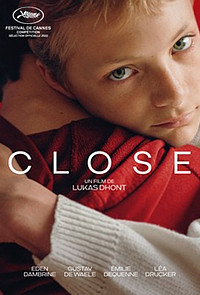 dir Lukas Dhont scr Lukas Dhont, Angelo Tijssens prd Michiel Dhont, Dirk Impens with Eden Dambrine, Gustav De Waele, Emilie Dequenne, Lea Drucker, Igor van Dessel, Kevin Janssens, Marc Weiss, Leon Bataille, Serine Ayari, Robin Keyaert, Herman van Slambrouck, Helene Theunissen release Bel 2.Nov.22, US 2.Dec.22, UK 9.Dec.22 22/Belgium 1h45 CANNES FILM FEST  Now streaming... |
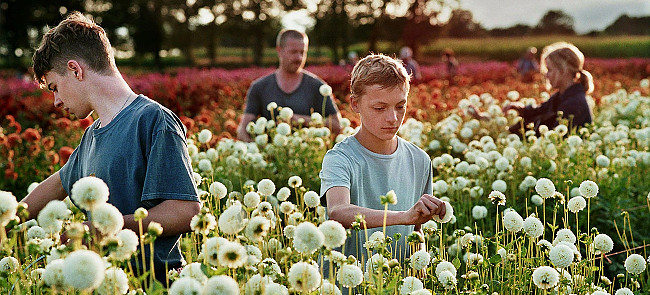 As in his 2018 debut Girl, Belgian filmmaker Lukas Dhont deploys an unusual gift for capturing the inner life of a child on-screen, avoiding the usual cliches to create something almost startlingly honest. Beautifully shot and skilfully edited, the film is strongly evocative, an especially astute, intimate exploration of relational politics between young boys. And as it takes some dark turns, it becomes an astonishingly well-observed coming-of-age drama. At 13, Leo (Dambrine) and Remi (De Waele) are inseparable best friends with boundless energy, impatient to grow up and travel the world together. They're so close that the girls in school tease them about being a couple. This unsettles Leo, who begins to quietly distance himself from Remi. But Remi doesn't understand why he's pulling away, and neither of them can comprehend the heavy emotions they're feeling about each other. As Leo throws himself into work on his family farm and hangs out with his hockey teammates, Remi struggles with feelings of isolation. There's a sunny, loose-limbed ease to the film's early scenes, in which these boys don't seem to know where one ends and the other begins. So it hurts to see this edge creep in between them, first in a bit of physical distance, then in a bit of roughhousing that goes too far. Dhont inventively depicts the subtle barrier that grows between them, then shifts the plot's trajectory in delicate ways that run emotionally deep. Eventually, the narrative takes a bigger turn that pushes things much further and becomes powerfully moving. Both Dambrine and De Waele are extraordinary, so relaxed and open in their performances that the viewer feels almost intermingled within the deep bond between Leo and Remi. Tiny details inform their relationship. In the more focal role, Dambrine is almost always on-camera, and his increasingly internalised feelings are hugely compelling in a wide range of seriously demanding scenes. As the boys' mothers, respectively, Drucker and Dequenne both have vivid scenes to play, opening their souls on-camera. Despite the enormity of the emotions involved, everything about this film is understated, including the casual homophobia that's laced throughout the schoolyard taunts. Deep undercurrents flow through each scene, as characters grapple in silence with their actions and reactions. And Dhont keeps everything so intimate that we can't help but be profoundly moved as we watch people struggling against the storms inside them. It's an important reminder of the power of compassion, even if only in a silent hug.
| ||||
|
EO Review by Rich Cline | 
| |||||
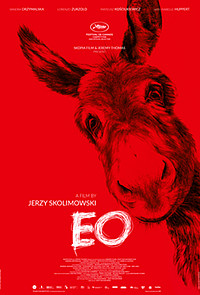 dir Jerzy Skolimowski scr-prd Ewa Piaskowska, Jerzy Skolimowski with Sandra Drzymalska, Isabelle Huppert, Lorenzo Zurzolo, Mateusz Kosciukiewicz, Tomasz Organek, Lolita Chammah, Agata Sasinowska, Anna Rokita, Michal Przybyslawski, Gloria Iradukunda, Piotr Szaja, Aleksander Janiszewski release Pol 30.Sep.22, US 18.Nov.22, UK 3.Feb.23 22/Poland 1h26 CANNES FILM FEST TORONTO FILM FEST  Is it streaming? |
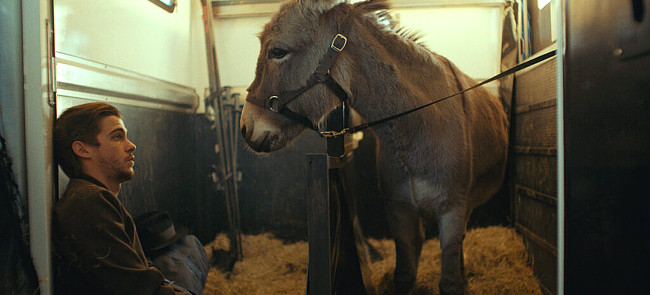 Veteran filmmaker Jerzy Skolimowski takes a donkey's eye view of modern Europe in this stylised odyssey. The artful, often surreal approach is frequently astonishing, providing the audience with an unusual perspective at each step in the story. This is a bold and mesmerising excavation of the nature of existence for all living creatures. And most remarkable is that the film never humanises its subject, instead celebrating its animal instincts. When a circus is closed for animal cruelty, the donkey EO is separated from beloved trainer Kasandra (Drzymalska) and moved from one place to the next. Whether put to work or tenderly cared for, only the occasional person takes the time to actually see EO as a living being. In moments of fear or longing, EO goes on the run, travelling from Poland to Italy through fields, forests and cityscapes. Missing his more caring minders, particularly Kasandra, he eventually teams up with a young priest (Zurzolo) for a visit to a seemingly mad countess (Huppert). Because the camera observes almost everything as EO does, most of the dialog is incidental, revealing human intentions that EO can understand. This means that the film is mainly silent, augmented by heightened ambient sounds and Pawel Mykietyn's expressive score. And Michal Dymek's inventive camerawork continually adds involving, catching details on both grand and microscopic scales. All of this works together to also offer overtones of horror in some nightmarish sequences, many of which are washed in a red hue. Each chapter in EO's journey offers a different set of experiences, from a panicky situation in a barn with over-excited horses to a cuddly group of children in a haystack. EO goes partying with a group of raucous footballers, and then has a terrifying encounter with their rivals. A shocking twist of fate saves him from a sausage factory. Amid moments of light comedy and unnerving violence, EO seems to have a sense of justice, quick to spot a friendly face and taking action when needed. And he does all of this on his own terms, as a donkey. Refreshingly avoiding the Disney-style urge to make EO behave like a person might, Skolimowski is able to bracingly depict the often harshly one-sided relationship humans have with animals. More hopefully, the film also reveals the things all living beings have in common, like the joy of a tasty treat or yearnings for compassion and freedom. And ultimately, there's dignity in depicting a creature in a way that is impossible for a human to understand.
| ||||

See also: SHADOWS FILM FESTIVAL © 2022 by Rich Cline, Shadows
on the Wall
HOME | REVIEWS | NEWS | FESTIVAL | AWARDS
| Q&A | ABOUT | TALKBACK | | ||||

